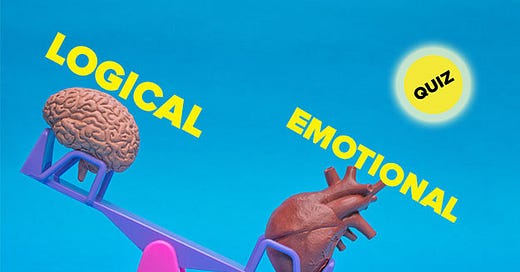I intend a multi-chapter discourse on this topic. Perhaps boring to start but will hopefully get more interesting.
The characteristic that has made humans the apex species on this planet is most certainly our ability to think. Our logical, problem-solving brains have powered the evolution of humanity from the use of simple stone tools to the marvels of technology today; innovations that can carry us to the moon or put the accumulated knowledge of the world on a small device we carry in our pocket. Not only do humans benefit from the great logical capacity in our heads we actually have a second way of thinking, what I call heart thinking, but commonly called emotional thinking by social scientists.. I would argue that recognizing these two ways that we think, and striving for the right balance,may help solve some of the deep divisions apparent in western society in the 21st century
Thinking from the heart is the human capacity for empathy and compassion that was long considered substantially absent from all other animal species. Philosophers in the past have argued that only humans have the capacity for empathy and that is what makes us truly distinct as a species. While modern research is decisively showing that other higher order species do demonstrate empathy, it is less easily observable. An example is that a horse walking along a trail that comes upon the body of a dead horse will simply keep walking. A human, however, finding a person lying at the side of a trail would likely stop to investigate or to offer help. A range of emotions would come from such a find, all for someone we do not know. We might take time and effort to bury the body or carry it to another place. Actions quite illogical from the point of our own self-interest, but are done out of compassion for a fellow human being. This is heart thinking.
To forestall the animal rights activists, my argument here is not that animals lack heart thinking, but that this dual capacity is strong and present within all human beings. We have our logical brain (head thinking) that allows us to solve great problems, but our heart thinking routinely leads us to make decisions not based on logic, but on the very human emotions such as love, empathy, lust, or greed. Sometimes our heart thinking is at direct odds with our head thinking. Running into a burning house to save a neighbor, to our own peril, is thinking more from the heart than the head.
Critical points include.
heart thinking and head thinking exists within us all.
it is not a matter of one type being right or wrong, but rather two modes or tools for our thinking process.
any individuals’ thoughts and actions always involve a blend.
The blend, however, varies significantly between individuals. Thought of as personality, we can all recognize a caricature of the matter of fact, logical approach to life of the dominant head thinker. Attracted to things and practical problem solving, this human variant can easily be found gathering in engineering schools and corporate boardrooms. Logic and facts are of primary importance. While head thinking may dominate in this personality, thinking from the heart is seldom entirely absent. When it is, a psychologist would consider it a pathology, such as a sociopathy.
While head thinking has powered human civilization to its great technical advances, it is thinking from the heart that gives us richness and meaning in life. It powers the artists and creative thinkers that have enriched the world. It is the glue that maintains a cohesive social structure essential to survival as a species.
Searching for the dominant heart thinker is best done in social interactions, in hospitals or charitable organizations. It is when we think with our heart to care for a fellow human, to set aside self interest for the benefit of another, that we often derive our greatest satisfaction. Love is the essence of heart thinking. Volunteering for military service could be considered heart thinking.
Take a little time to think of your own thinking or of someone that you know well. Can you recognize the times when heart thinking dominates your decisions and other times when head thinking decides the issue? You are also likely to recognize the times that these two styles led to different conclusions, either within yourself or when interacting with another person.
The importance is to recognize these two types of thinking, to acknowledge they are within each of us, and that each style offers a benefit to us as individuals and to society. If we understand that heart thinking dominates for some people, for others, it is the logic of head thinking that leads. That makes us different, not wrong. I am suggesting that to be a better person, to be more successful in social interaction, you should strive for balance between head and heart.
In 2023 I listened to a podcast where two people debated the issue of immigration in America. They had different perspectives and different solutions to this issue. In simplistic terms the topic was whether America should build a wall at its southern border. Each person offered up sound, compelling arguments for their point of view and I agreed with many of the points from both speakers. In the back and forth, however, it became obvious that these two people had completely different fundamental principles. One person was very focused on the logic of a strong American border, of the fact that the illegal immigrants were breaking the law and that the cost of these illegal immigrants in both economic and social terms was unknown but perceived to be large. America was for Americans and these legal immigrants did not deserve the advantages that America offers because they hadn't contributed, and they hadn’t followed the rules. In my mind there was no denying the logic of this dominant head thinker.
The other speaker came from the perspective of great empathy for the migrants. The fact that they were poor, downtrodden, and at risk of violence in their home countries meant that Americans needed to help these people, to allow them into the country to share the advantages that Americans enjoy. He was very concerned with the unfairness between the difficult lives the migrants faced at home against the bounty that America offered. In his mind, a concern for humanity overrode the arguments for law and security exclusively for Americans. A fine example of heart thinking.
An interesting exercise is to examine your own approach to thinking and consider whether that approach may be out of balance or to at least acknowledge a different approach to a topic has some foundation. Is there middle ground that can be reached? Some movement available towards a compromise?
Some may see efforts to open immigration as illogical as it may run counter to their own personal interests and opens the door to unintended consequences. Is it not reasonable however, to see that people thinking more from the heart may have an approach and perspective that is logical from their point of view? Surely concern for a fellow human you are in a position to help should outweigh the logical objections?
For the heart thinker, your horror and disgust at the cold-hearted head thinker may, in fact, be a manifestation of an illogical approach to a problem on your part. Yes, you want to help but is your solution utopian? Making a little more effort to head think may temper your enthusiasm for unbridled empathy.
Human’s in their nature are never perfect and we all display weakness and faults alongside our goodness and ingenuity. The wise individual that seeks to better themselves understands that perfection is impossible. The wise know that the very definition of perfection is imperfect. The best we can do is to lean towards that which we know to be good. The goal should not to be perfectly kind, but to try and be kinder. Not to never lie, but to lie less.
That applies to our thinking. The suggestion is not to be completely logical, but where head thinking dominates, to lean into our heart a little more. And vice versa.
I would suggest that some of the divisiveness in the cultural debates of our 21st century society could be mitigated by considering mutual positions on the head/heart continuum. Can your own position on a subject be moved a little closer to center by giving more consideration to your less dominant style? In appealing to a debate opponent, recognizing their dominant style could aid in finding common ground.
This stream of consciousness to be continued. Do your own heart/head balance check while waiting.
Take this quiz from Buzzfeed, Just for fun.







